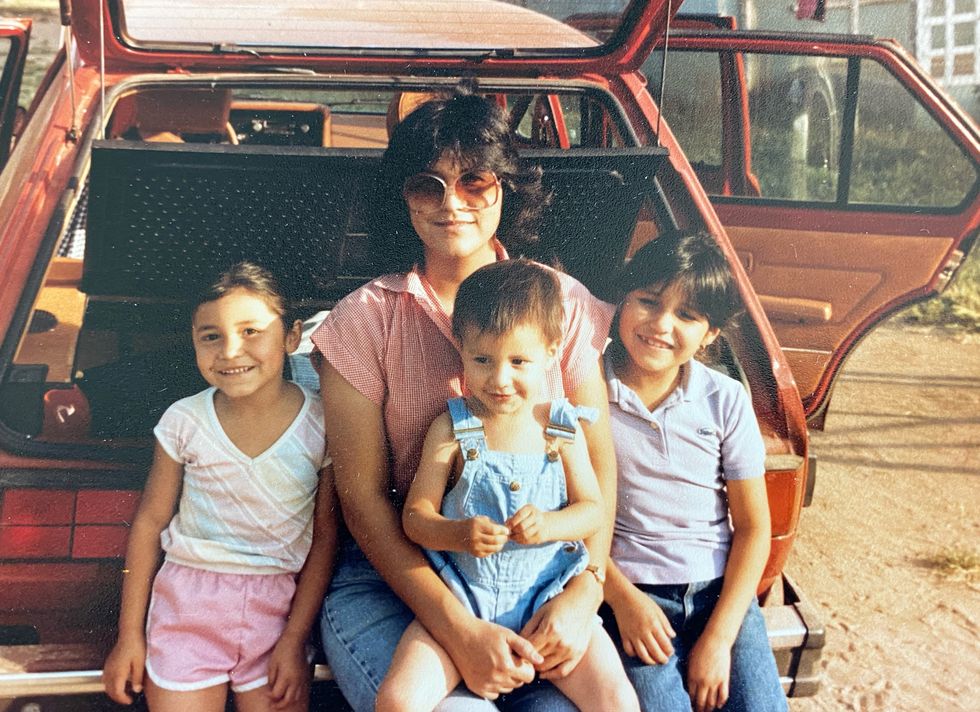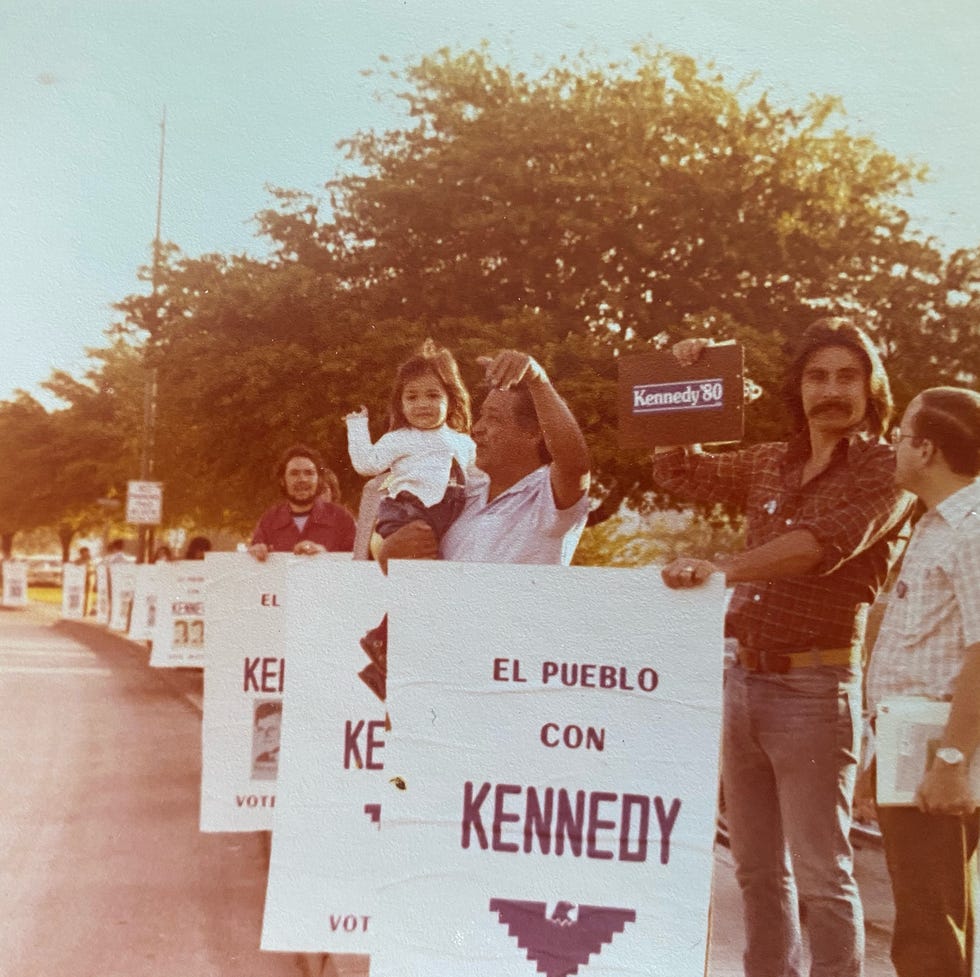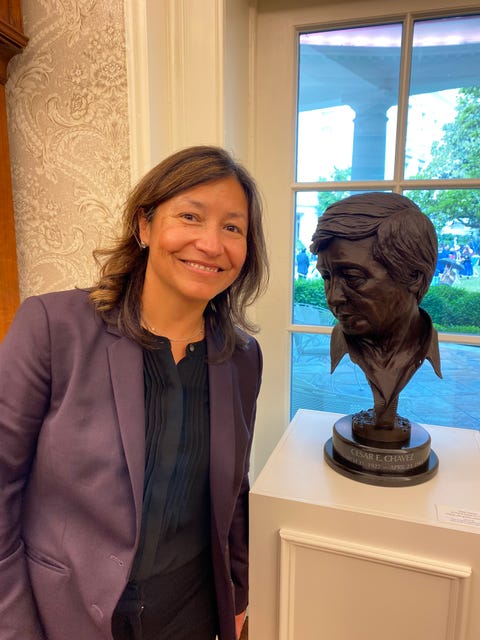Cesar Chávez Taught His Granddaughter to Organize. Now She’s Managing the Biden Campaign.
In the summer of 1988, when Julie Chavez Rodriguez was 10 years old, she vividly remembers her grandparents gathering the family together in their living room so her grandfather Cesar Chávez, the 61-year-old legendary cofounder of what eventually became the United Farm Workers (UFW) labor union, could tell them about his plans to begin a water-only fast to protest the use of five pesticides on table grapes, which the union contended were causing cancer and other serious health problems in fieldworkers. Chávez would go on to fast for a grueling 36 days; it was the longest and last fast of his life (he died five years later).
Chavez Rodriguez and her older sister were sometimes responsible for keeping him hydrated. “We saw him grow very weak and we saw the personal toll it took on him,” she says, tears welling in her eyes at the memory. “But we also saw how heroic he was in those moments.” She fasted herself, for three days. “It was so hard,” she remembers, “but it was an important way to experience what my grandfather had chosen to take on.” All five pesticides were eventually effectively banned.
It’s hard to imagine a more formative, or fitting, upbringing for the woman who would go on to be named manager of President Joe Biden’s 2024 reelection campaign. “So much of my experience growing up was the perfect training ground for the work that I get to do now,” Chavez Rodriguez says. “It was about bringing people together, being part of something bigger than myself, fighting for the rights of others, and improving people’s lives.”
After college at UC Berkeley, where she majored in Latin American Studies and spent her summers organizing strawberry pickers in Watsonville, California, she worked at the Cesar Chávez Foundation for nearly nine years, first as a program manager and later as director. In 2008, Chavez Rodriguez became a full-time volunteer for the Obama presidential campaign in Colorado, focused on mobilizing the Latino vote.
Her work ultimately helped turn the state blue, and she landed a job in the Department of the Interior, for two years, before being plucked by Valerie Jarrett for a job in the White House. She worked there for five-plus years, ultimately managing the White House’s outreach to key groups including Latinos, veterans, Native Americans, LGBTQ+ communities, and Asian American and Pacific Islanders.
After Obama left office and the Trumps came to town, Chavez Rodriguez went to work with then senator Kamala Harris, eventually joining her 2020 presidential campaign. After Harris left the race, the Biden campaign hired Chavez Rodriguez to do what she does best: turn out Latino voters. And after Biden won, she was named director of the White House Office of Intergovernmental Affairs, making her the highest-ranking Latina in the administration.
Though she first entered the insular Biden circle as an outsider, people on the campaign and in the administration now use the slogan, “In Julie we trust.” Says Chavez Rodriguez: “Coming into the Biden world, I wanted to learn and absorb as much as I could. I knew I was getting an opportunity to have a seat at the table with the best of the best.” (Of the “In Julie we trust” line, she adds: “It’s very sweet. I think people are way too complimentary, but I am humbled by the team I get to work with.”)
Given her background and résumé, when Chavez Rodriguez was announced as manager for the reelection campaign, commentators saw it as a sign of a renewed focus on Latino voters among Democrats.
Historically, Latinos—the nation’s youngest and fastest-growing voting bloc—have been reliably blue, but the 2020 presidential election saw a rightward shift, with about three in five Latinos voting for Biden, down from about two in three who backed Hillary Clinton in 2016, according to the Pew Research Center. Those results sounded alarm bells among some Democrats, who said the party’s Latino outreach was too little and too late and couldn’t compete with Trump’s appeal among Latinos, largely due to his messaging on the economy.
But while Democrats have been losing support in Florida and South Texas, they have made gains in Nevada and Arizona. “I think what some people are starting to recognize—definitely not me, given my upbringing and heritage—is that we’re a very diverse community,” Chavez Rodriguez says.
And she knows how to reach them all. The campaign will try to bring as many “diaspora communities” as possible into the broader coalition by targeting voters in states with growing Latino populations, including Arizona, Nevada, Georgia, North Carolina, and Pennsylvania. The campaign will reportedly also spend big on bilingual ads narrated by speakers with different Spanish accents, and have specialized groups focused on various nationalities like “Colombianos con Biden.” The Trump and DeSantis campaigns both could mount a strong challenge: Trump remains popular among Latinos without college degrees, and DeSantis’s reelection as governor in Florida marked the first time a Republican won Miami-Dade County in two decades, which he did by capturing 62 percent of the Hispanic vote.
The task ahead of Chavez Rodriguez is likely to be one of the defining roles of her life. The days will be long, and with many predicting a rematch between Biden and former president Donald Trump, they may also be ugly. In those moments, Chavez Rodriguez says she will likely lean on the lessons instilled by her family: “Politics is not easy. It’s not for the faint of heart. But with strong roots like mine, it’s easier to weather the storm. They anchor me, and that keeps me strong and growing.”

Deputy Editor
Kayla Webley Adler is the Deputy Editor of ELLE magazine. She writes and edits cover stories, profiles, and narrative features on politics, culture, crime, and social trends. Previously, she worked as the Features Director at Marie Claire magazine and as a Staff Writer at TIME magazine.





